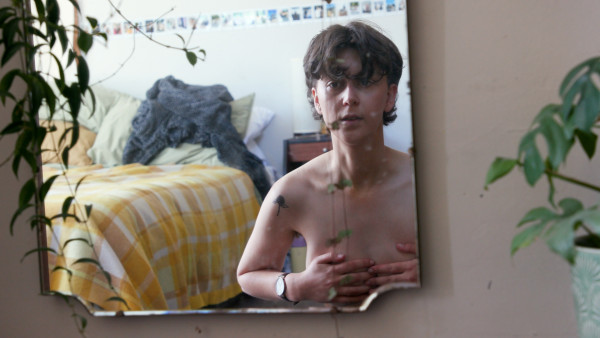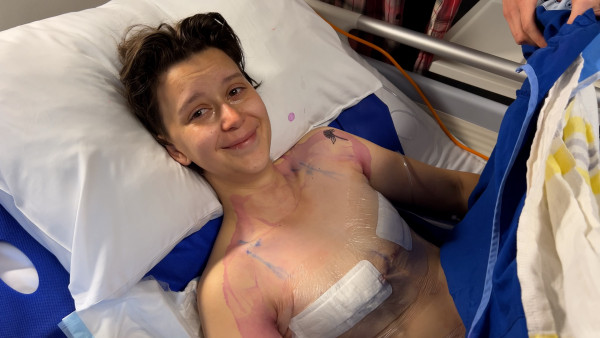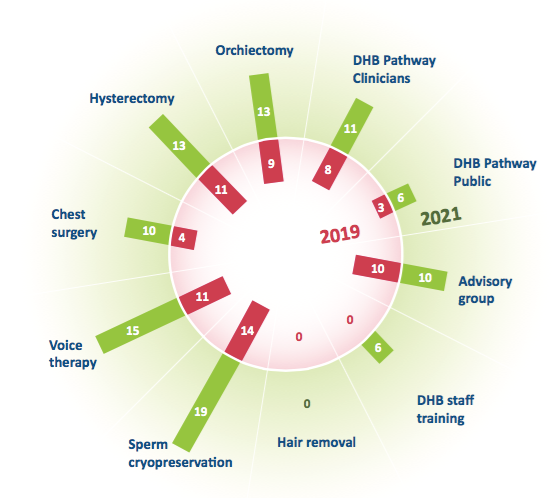Months after being referred for top surgery, non-binary person Stevie received a rejection email saying the public health system had no capacity - an email many gender diverse people are familiar with as the system struggles to meet their needs.
Stevie felt uncomfortable in their body ever since they went through puberty and their chest became a physical and emotional burden.
“In my lower moments I’ve just looked in the mirror and cried, or been angry, or tried to rip [at my chest].
“It’s just not me. It’s just not right. I can’t explain it.”
Earlier this year, they decided to have top surgery - a gender-affirming procedure where a person's chest is made to be more feminine or masculine.
In Stevie’s case, they wanted to have their breast tissue removed.
But as they and many other gender diverse people have found, the demand for gender affirming surgeries and care in Aotearoa is far outstripping the capacity of the public health system.

Stevie’s journey to top surgery
Stevie began by discussing the idea with their GP who referred them through the Capital and Coast District Health Board.
Two months later, Stevie received a rejection saying there was no capacity for surgery and that they wouldn’t even be seen for an appointment or put on a waiting list.
“They actually told me that I was denied on Transgender Day of Visibility this year, which was really sad. You would think they would have a little bit more compassion to think about that before sending that email,” Stevie says.
Stevie says the rejection was crushing and for many months they resigned themselves to living with the discomfort they felt in their own body.
But finally, they got up the courage to go back to their GP who told them their only other option was through a private hospital.
While the private system referrals and appointments came quickly, the challenge became paying for the operation - which costs around $24,000, not including appointments.
“[My first thought was] ‘Ooh, that’s a lot of money!’” Stevie says.
“But I’ve been really fortunate and had so many wonderful people in my community donate money to me.”
Stevie raised just shy of $13,000 on a Givealittle page, another couple of thousand dollars at a movie fundraiser, and roughly $1,000 from a show they performed with their improv company, Tiny Dog.
The rest Stevie took from their KiwiSaver account.
Stevie jokes that they’ve traded their retirement for the surgery, saying they’ll either work till they die or “be thrifty in old age”.
“But it's worth it for me at the moment. I'd rather invest in my now than invest in my possible future - because ultimately my possible future is sad if I don't get this surgery.”
After almost a year of effort and setbacks, Stevie finally had their top surgery performed at the end of November.
Looking down at their new chest a few hours after surgery, with tears in their eyes and a huge smile on their face, they said, “It feels right, which is so cool. I’m really, really happy.”

The urgent need for gender-affirming care
The 2018 Counting Ourselves survey found 71% of transgender people in Aotearoa were experiencing high levels of distress, compared to 9% of the general population.
The Professional Association for Transgender Health Aotearoa highlighted a lack of gender-affirming care as a core reason for this.
The Counting Ourselves survey found one in five trans people wanted hormone treatments and didn’t have access to them, and 50% of trans women had unmet needs for voice therapy and genital reconstruction.
The highest demand of any gender-affirming care was trans men wanting chest reconstruction. Ninety-seven percent wanted this procedure, but only one in three have had it.
A quarter of people who wanted chest reconstruction said they hadn’t had it because the public health system waiting lists were too long, and 69% said they couldn’t afford to have it done privately.
Since 2018, there have been some funding increases that slightly raised the number of gender-affirming surgeries performed in the public health system, but the numbers are still relatively low.
For example, in 2019 the public health system performed four chest surgeries as part of gender-affirming care - which includes both chest masculinisation and feminisation. That rose to only 10 chest surgeries in 2021.

Gender-affirming healthcare across the 20 former DHBs in Aotearoa. Source: PATHA.
The fight for fair healthcare
Gender Minorities Aotearoa national coordinator Ahi Wi-Hongi says this year they have had 6,487 enquiries about binders - a strap trans men wear to cover breasts.
While it is only a rough indicator, Ahi says it demonstrates just how inadequate 10 chest surgeries a year is for meeting the needs of trans and non-binary people in Aotearoa.
Ahi says the real number of people requiring gender-affirming care in Aotearoa is difficult to know because the only data collected by the public health system are the surgeries or care that have been granted.
Ahi says even if data was collected on all the people applying for this care it still wouldn’t be representative of all the people who need it, because many trans people are either too scared to approach the public health system for fear of being disrespected or dismissed, or have given up on the system after it failed to meet their needs.
This leaves the private system as many people’s only option, and Ahi says they have seen many people put themselves in incredibly difficult situations and hardship to save for their private healthcare - including couch surfing, or living on the street.
“People go to such lengths to get their healthcare, because the system is failing them,” Ahi says.
Ahi says we ultimately need a health system that lowers any barriers to trans people receiving care, including removing stigmas and overcomplicated processes in order to get care like hormone treatments, and increasing funding to provide more services.
More stories:
He said he can't make me orgasm because I use a vibrator
Why that's a myth.
Vaginismus is a common health condition. Why is it so ‘taboo’ to talk about
Many people with vaginismus - involuntary tensing of the vagina - feel it's not taken seriously.
How colonisation has changed the naked body
"If I raise a daughter, I'm hopeful about the world she will live in as a Māori woman."